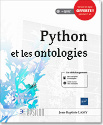Load an ontology from a local repository, or from Internet:
>>> from owlready import *
>>> onto_path.append("/path/to/your/local/ontology/repository")
>>> onto = get_ontology("http://www.lesfleursdunormal.fr/static/_downloads/pizza_onto.owl")
>>> onto.load()
Create new classes in the ontology, possibly mixing OWL restrictions and Python methods:
>>> class NonVegetarianPizza(onto.Pizza):
... equivalent_to = [
... onto.Pizza
... & ( restriction("has_topping", SOME, onto.MeatTopping)
... | restriction("has_topping", SOME, onto.FishTopping)
... ) ]
... def eat(self): print("Beurk! I'm vegetarian!")
Access ontology class, and create new instances / individuals:
>>> onto.Pizza
pizza_onto.Pizza
>>> test_pizza = onto.Pizza("test_pizza_owl_identifier")
>>> test_pizza.has_topping = [ onto.CheeseTopping(),
... onto.TomatoTopping(),
... onto.MeatTopping () ]
Export to OWL/XML file:
>>> test_onto.save()
Perform reasoning, and classify instances and classes:
>>> test_pizza.__class__ onto.Pizza >>> # Execute HermiT and reparent instances and classes >>> onto.sync_reasoner() >>> test_pizza.__class__ onto.NonVegetarianPizza >>> test_pizza.eat() Beurk! I'm vegetarian !
More examples are available in the documentation and the /doc/examples directory in the sources.



